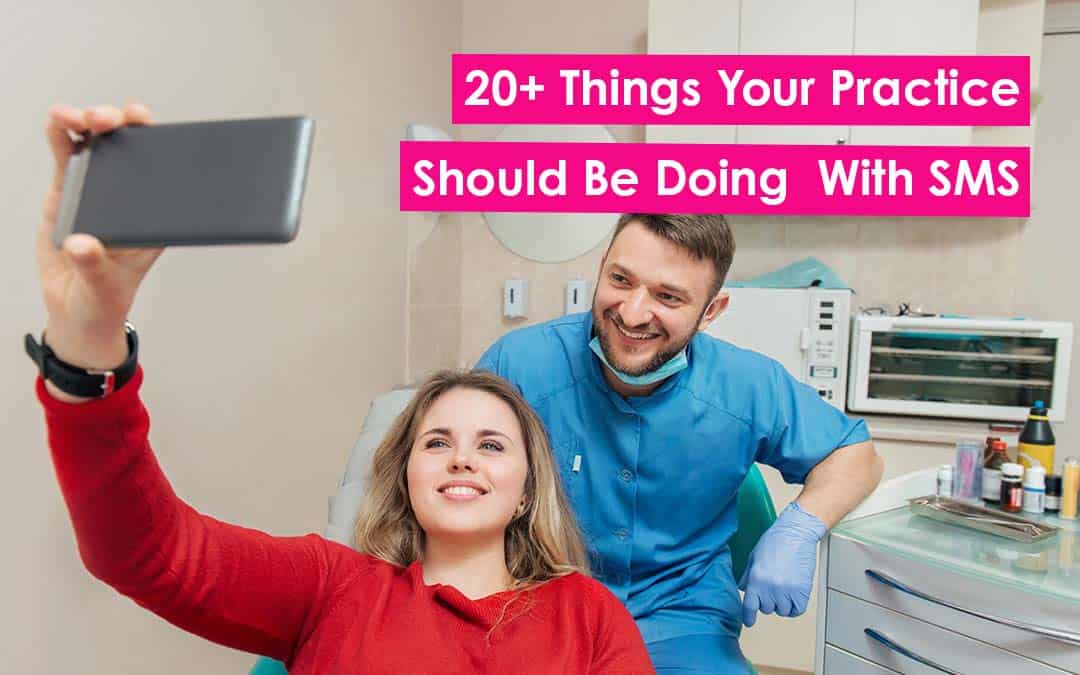SMS, or Short Message Service, is more than just a tool for personal communication. It has emerged as an effective way for healthcare practices to enhance patient engagement, streamline communication, and improve the overall patient experience. Here are 20 practical ways your practice can utilize SMS for the benefit of your patients and your business:
- Appointment Reminders: One of the most common uses of SMS in healthcare practices is sending appointment reminders. It’s a practical way to reduce no-shows and last-minute cancellations. With a simple text reminder, you can ensure your patients keep their appointments.
- Direct Scheduling: Texting makes the process of scheduling or rescheduling appointments simpler and more efficient. Patients can easily confirm their availability or reschedule if necessary, straight from their mobile phones.
- Payment Reminders: Do you have patients with outstanding bills? Gentle reminders through SMS can encourage them to settle their accounts promptly.
- Promotions and Discounts: Offering special promotions or discounts? Make sure your patients are in the loop by sending a quick text message.
- Recall Appointments: Regular check-ups are vital to physical and oral health. You can use SMS to remind your patients when it’s time for their next check-up or cleaning.
- Health Tips: Engage your patients by sending them daily or weekly tips. This can help emphasize the importance of their health and make your practice a reliable source of information.
- Aftercare Instructions: After a procedure, you can send aftercare instructions or tips via SMS. This will help your patients take proper care of themselves post-treatment.
- Lab Result Notifications: Waiting for lab results can be nerve-wracking for patients. A simple text notification when results are ready can relieve this anxiety.
- New Services or Products: If your practice offers new services, products, or technologies, make sure to update your patients via SMS.
- Emergency Alerts: In case of a emergency, SMS is a quick and reliable way to contact your patients.
- Follow-up Messages: Keep your patient care personal by sending follow-up messages to check on a patient’s wellbeing after a procedure or treatment.
- Feedback Requests: Looking to improve your practice? Send out a quick SMS to request feedback or reviews after appointments.
- Dental Education: Your SMS service can double as an education platform. Send out links to helpful articles or videos about their health.
- Closure or Holiday Notifications: Inform patients about office closures or changes in operating hours during holidays through a quick SMS.
- Waitlist Updates: Do you have a waitlist? You can notify patients when an earlier appointment becomes available.
- Insurance Reminders: You can remind patients when their insurance benefits are about to expire or if they have unused benefits.
- Office News or Updates: Keep your patients in the loop about any changes in staff, new office policies, or other relevant updates.
- Patient Birthdays or Anniversaries: Sending well wishes on special days can help build rapport and increase patient loyalty.
- Pre-appointment Instructions: Before certain procedures, patients might need to prepare in some way, such as fasting. Sending these instructions via SMS ensures they are well-prepared for their appointment.
- Event Invitations: If your practice is hosting an event, workshop, or open house, an SMS invitation can help boost attendance.
While SMS can be a powerful tool for enhancing patient communication, it’s crucial to get consent before sending messages and to comply with all relevant laws and regulations regarding patient privacy and communications. Check out this article on SMS & MMS compliance. Using SMS effectively can lead to better patient engagement, improved communication, and a smoother operational process in your practice.

